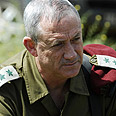
Gantz: We need haredim on borders, at bases
In special Independence Day interview with Ynet, conducted during military drill in Jordan Valley, IDF chief discusses Iranian nuclear threat, Syrian civil war and haredim in army. 'Deterrence achieved in Pillar of Defense significant, but if rocket fire from Gaza persists, we will reassess situation,' he says
Something has changed within the IDF in 2013, apparently for the better. In general, IDF officials seem to be talking less and doing more.
Preparedness: The army knows it will not have advanced warning of a war, should one break out. Therefore, it is placing an emphasis on its ability to operate from one moment to the next. As part of this strategy, relatively large-sale exercises are being held, and the army is training for 'unplanned incidents.' In contrast to the era of 'old wars,' during which large land armies fought each other, today the IDF is bolstering its ability to operate with small units against specific targets. The army is also boosting its cyber warfare capabilities.
Execution: The IDF is dealing extensively with special, under-the-radar-operations. Foreign media outlets report from time to time on unusual operations - a mysterious blast here, a mysterious flyover there – all attributed to the IDF. Sources with knowledge of the army's activities said the rate of such operations has increased significantly over the past one or two years.
Structure: As opposed to the previously held notion, according to which the army must be prepared for any kind of threat, today the IDF is focusing on being prepared to deal with concrete threats, most of which involve an asymmetrical war: Fighting against guerilla and terror forces; operations against remote targets; dealing with Iran's nuclear armament and weapons smuggling to far-off fronts. Now the army faces a new challenge: Protecting Israel's off-shore gas fields.
Internal calm: Those who have followed the 'wars' between the generals, particularly over the past decade, can't help but be impressed by the decline in political power struggles within the IDF. It seems that the current General Staff forum has a businesslike attitude and is devoid of internal strife. Apparently, there is something about IDF Chief of Staff Lt. Gen. Benny Gantz's demeanor that brings a sense of calm to the army.
Last Wednesday, Ynet reporters accompanied Gantz to IDF training grounds in the Jordan Valley to observe an exercise of the Givati Brigade's Shaked Battalion. The army chief ran behind the fighters, who were using live fire while storming a target simulating a Lebanese mountain range controlled by Hezbollah terrorists. The army chief was obviously enjoying himself.
On the sidelines of the drill, on the training grounds, Gantz answered Ynet's questions.
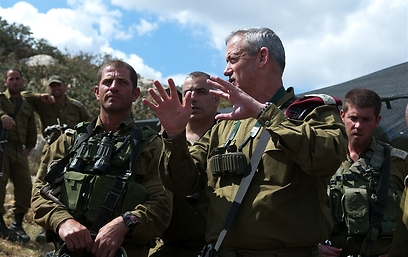
Gantz with soldiers in Jordan Valley (Photo: Gur Dotan)
Will there be downsizing in the army due to the fact that a land war against enemy armies is less likely?
"The likelihood that we will see 'maneuvering' type of fighting – which we remember from 1973 – has decreased, but there is a sharp rise in security-related challenges: Israel is surrounded by a (missile threat). To remove this threat from the home front we need defense systems that will allow the home front to survive the war and provide the army with intelligence and attack capabilities in every realm, so it will be able to shorten the war and win quickly. It is up to the government to decide on the amount of resources that will be allocated toward this end. This is a heavy decision. I suggest that we listen to President (Shimon) Peres, who said that the State invests in every field according to its ability, but when it comes to security it should invest as much as is needed."
Should the army's structure change to deal with what appears to be the main challenge at this time: War against guerilla and terrorist forces?
"The IDF has been built up over the years with the concept of a full-scale, extensive war in mind. The size of the IDF has changed in accordance to needs-assessments over the years. We will suggest reforms now as well, but we are in a multi-front reality and every event which occurs in a certain location can have potentially dramatic effects on other fronts. Thus, we must exercise caution.
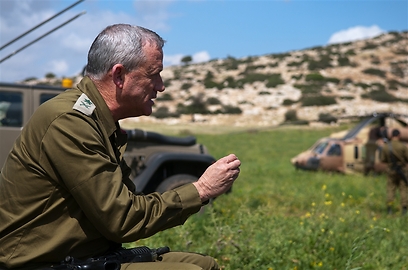
'Day after day, hour after hour.' Gantz during drill (Photo: Gur Dotan)
"Closing options is something we can do in a single decision. It is very hard to rebuild what you have given up on. There is room for changes and we are working on it, and they must be brave yet also responsible. If we act hurriedly, we will meet in front of an inquiry commission, which doesn't bother me in itself. What bothers me is the price that will bring us to that point; this is a price I am not willing to pay."
There is a clear rise in the number of riots in the West Bank. Are we slowly heading toward a third intifada?
"The IDF, together with the other security forces, is operating constantly all across the West Bank on the basis of solid intelligence and freedom to operate, which allow us, in most cases, to thwart terror attacks. The level of security in the West Bank, in most cases, is sufficient. We must continue to work on this day after day, hour after hour. I do not see us moving toward a third intifada."
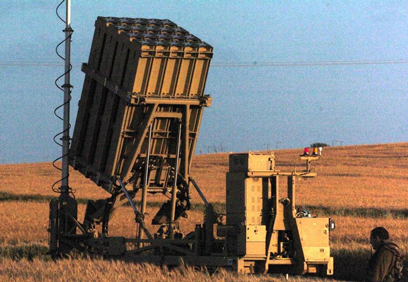
'Lift threat from home front.' Iron Dome battery (Photo: Herzel Yosef)
How do the 'price tag' acts affect the reality in the West Bank?
"The reality is sensitive – and a developing terror incident can lead to escalation. 'Price tag' acts are unacceptable and are sometimes very severe. There is no justification for 'price tag'. These are acts on the brink of terror."
Lately we have seen a number of rocket attacks emanating from the Gaza Strip and violent incidents along the security fence. Has the deterrence created during Operation Pillar of Defense been eroded?
"The deterrence we achieved during Pillar of Defense is very significant. The complete calm that has prevailed is a testament to this. The deterrence has not been eroded, and a few shooting incidents do not necessarily indicate a return to the reality which existed before Pillar of Defense. However, if we do not return to complete calm and the firing continues, we will (reassess the situation)."
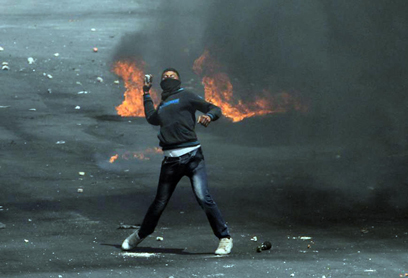
'No third intifada expected.' West Bank riots (Photo: Gil Yohanan)
How much time do you give (Syrian President Bashar) Assad and how are we preparing for it?
"I am not standing with a stopwatch in hand, but I suppose he won't hold on much longer. Assad is fighting his own people more brutally than we fight our enemies, with a thousand casualties and more each week. We are facing a potentially problematic and unstable security-related reality. Syria is a large country with many military capabilities. If this (situation) spins out of control and moves to terror organizations that will be based in Syria or to Hezbollah – it may pose a significant security challenge. Therefore, we are preparing with many activities related to establishing our intelligence capability and complementary operational capabilities."
Do you identify opposition forces in Syria with which we will be able to engage in dialogue?
"Not all the rebels there are Jabhat al-Nusra or Global Jihad. Some belong to local groups. We will have to see how things develop and establish ourselves correctly."
And what about the border fence?
"We've had 40 years of calm and stability in the Golan, and the barrier there suited our needs. About a year ago we launched a new project to improve the operational infrastructure, and we will complete the entire barrier."
Iran, according to estimations, will reach the brink of being able to build a nuclear bomb by the end of the year. Where does that put us?
Iran can achieve nuclear capabilities by the end of the year, but this does not mean that it will. The pressure on Iran should be stepped up – the isolation, sanctions, the continued pressure, as well as the operational capabilities, which we will not specify. We have the ability to deal with the dangers Iran presents to us."
And where are the Americans in all of this?
"If we increase the pressure on Iran, time will be on our side. The Americans understand this, but they have their own considerations. When (Defense Secretary Chuck) Hagel visits Israel this month, obviously we will not talk about Tanzania."
Do you need all the haredi manpower (the government) wants to bring into the army?
"We need more manpower, and we will be pleased if the ultra-Orthodox serve in the IDF. They have brought good results wherever they have served to date, and they will learn that army service benefits them as well. I think that in the framework of a gradual and stable process, we will be able to incorporate more and more elements of Israeli society. We need these people – on the borders, at the bases and at the headquarters."
Would you want to incorporate the haredim even at the price of neutralizing the women in these units?
"Absolutely not. The IDF is a State's army in which everyone can serve, and women in the IDF contribute greatly in every aspect. Let us remember that during the liberation of Jerusalem we needed both Rabbi Goren and Shuli Natan."
- Receive Ynetnews updates directly to your desktop










